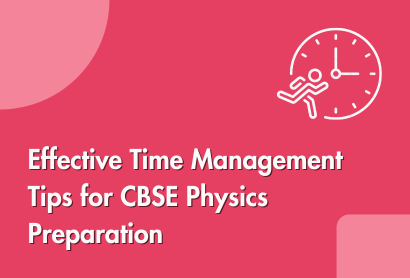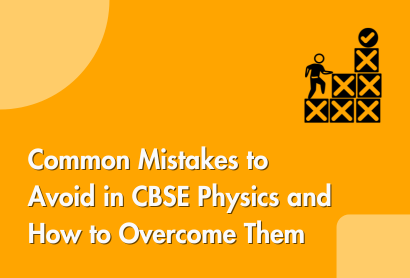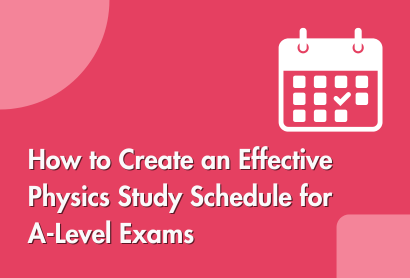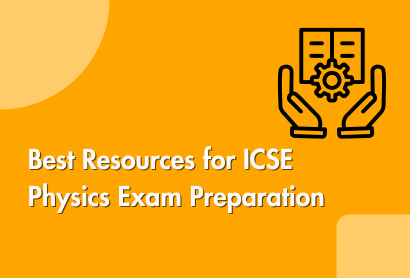Effective Time Management Tips for CBSE Physics Preparation

Time management is the key in preparing for CBSE Physics. The topic needs grip over it, regular practice and the ability to solve questions in a said limited time. So students who take to studies in the right manner can cover this gargantuan syllabus quickly and fare well in their exams. So here are some great time management tips for students to prepare for CBSE Physics. Create a Realistic Study Plan How to Create an Effective Revision Timetable- The first thing you need to do to manage your time wisely is to “Make a Realistic study plan” and be very DETAILED about it. Devise a plan to discuss your CBSE Physics syllabus into small parts and decide which chapter or section should be discussed on which day. Do not aim for too great a target, this might be frustrating and liable to burnout. Focus on hard subjects initially, give more TIME to them but also keep time for revision as well practice. Build discipline and consistency by sticking to your schedule as closely as you can. Understand the Weightage of Each Chapter The marks distribution of Physics in CBSE varies from one chapter to another. In board exams, some topics like Mechanics, Electricity and Optics usually carry more weight. Having the distributive idea of marks will guide you to give more time to important topics and also prevent you from spending more time in less significant areas. Most of You Are Surely Neglecting the High-Weightage Chapters, But That’s Fine; However STOP Ignoring Them Completely. Focus on Conceptual Clarity That is because Physics is a conceptual subject, and you are not supposed to learn this subject by memorizing formulas and definitions. Before doing this, you need to know the basics of each concept to manage your time effectively. The more you understand, the less time spent floundering during practice sessions. Do not revisit the topic again and again after getting confused once try to get even a doubt related to that topic under your belt as soon as possible if not from teachers then by referring good resources, or use reference books. Regular Practice of Numerical Problems Thus, numerical problems are also a big part of Physics and you can score full on them. Include solving numerical problems in your regular studies to make your time management better. This helps you to practice problem solving after completion of each topic which will let you revive the memory. Practice various types of sums, approaches from easier to difficult ones. This way, you can identify your shortcomings and make the approach to solve questions in the live test more efficient. Time Yourself During Practice Sessions But time management also means training under the pressure of a clock ticking down. If you feel confident on the topic, translate that confidence into timing yourself with questions and past papers. This can give you a feel for the pressure to solve questions within a stipulated time. Allocate time to solving each set of problems and be as consistent as you can be. Practice makes you quicker and more accurate with time. Use Short Breaks Wisely Though it may feel counterintuitive, taking a short break for rest every couple of hours will benefit the mind more than studying 8 straight hours. Fatigue kicks in, degrading the quality which you learn and the way that you are able to problem solve. Take a 5-10 minutes short break after every 45-50 minutes of focused study. Take this time to relax, move, or do anything that is not related to studying. This improves your concentration when you get back to studying and prevents burnout. Revise Regularly Being the opposite of boring, revision is how you will remember what you have studied and revising in time would actually mean utilizing every hour efficiently giving a great hike to your scores. However, rather than putting off your revision until the 11th hour, factors in some regular revisions appear throughout your preparation. Assign yourself time at the end of every week to review what you have learned. This will help keep the material front of mind and lessen any dependence upon procrastinating until last minute cramming. Solve Previous Years’ Question Papers To effectively manage your time, you can solve the previous year question papers. These papers tell you the levels of questions, pattern of exam, and students get to know most of the chances that there are constantly how much marks weightage allocated on which topics. By attempting these papers under exam-like situations you will learn where actually that one hour was vanishing. This way you can find out where to put in more effort and at the same time understand how to ease yourself while giving your actual exam. Focus on Weak Areas You may feel compelled to spend more time on the ones you know but that is not good use of your time. Spend more time with these but do not sacrifice other topics entirely. Focus on your most difficult areas and spend time untangling that there. Kids do come up with different kind of questions and with time, you experience a feeling that now they are gaining confidence while solving these problems which ultimately provides a balanced preparation. Avoid Multitasking Though multitasking is counterproductive in the case of studying CBSE Physics. It causes distraction in attention and loss of productivity. Don’t focus on more than one task or topic at once to save time. Focus: Whatever u r reading for a chapter, doing numbers or revising it focus on that thing completely. This means more in-depth work, and you won’t just skip around learning about everything only to never understand any of it. Stay Consistent and Maintain a Study Routine For any time management to work, consistency is key. Instead of reading only when it is near exams or doing last-minute studies, keep studying to read. Make a specific time daily for Physics Preparation. This will give you discipline and make sure that you are systematically covering the
Common Mistakes to Avoid in CBSE Physics and How to Overcome Them

Physics is one of the most challenging yet fascinating subjects in the CBSE (Central Board of Secondary Education) curriculum. For students aiming to score well, understanding concepts is essential, but so is mastering problem-solving skills. Often, students make common mistakes in Physics that cost them marks despite their hard work and preparation. This blog will highlight these mistakes and provide actionable strategies to overcome them. 1. Misunderstanding Fundamental Concepts Mistake: One of the most common mistakes students make is not having a clear understanding of the fundamental concepts. Physics builds on basic principles like Newton’s Laws, the concept of force, motion, and energy. If these are misunderstood, it leads to errors in solving even simple problems. How to Overcome: 2. Inadequate Practice with Numericals Mistake: Physics is not just about theory—solving numerical problems is critical. Many students focus more on theory, neglecting numerical problems, which leads to mistakes in exams due to lack of practice. How to Overcome: 3. Forgetting Units and Significant Figures Mistake: Forgetting to mention units or using incorrect units in final answers is a frequent error. Similarly, students often overlook significant figures, which leads to inaccurate results. How to Overcome: 4. Improper Use of Formulas Mistake: Blindly memorizing formulas without understanding their derivation or applicability is another common mistake. Students often confuse formulas or apply them in the wrong contexts, leading to incorrect answers. How to Overcome: 5. Neglecting Diagrams and Graphs Mistake: In physics, diagrams and graphs play an important role in explaining concepts like optics, electromagnetism, and motion. Students often neglect these visual tools or draw them inaccurately, which leads to loss of marks. How to Overcome: 6. Confusing Vector and Scalar Quantities Mistake: Many students confuse vector quantities (which have both magnitude and direction) with scalar quantities (which have only magnitude). This leads to incorrect calculations, especially in problems involving force, displacement, and velocity. How to Overcome: 7. Not Reviewing the Answer Sheet Mistake: A significant number of mistakes in physics exams happen because students rush through their answers and do not review their work. Errors such as missing a minus sign, wrong calculation, or incorrect application of a formula often go unnoticed. How to Overcome: 8. Misinterpreting the Question Mistake: Many students lose marks by misinterpreting the question, especially in lengthy word problems. Sometimes, the actual demand of the question is missed due to misunderstanding key terms or phrases. How to Overcome: 9. Overlooking Assumptions and Conditions Mistake: Some physics problems come with certain assumptions, such as “frictionless surface” or “ideal gas.” Students often overlook these conditions, resulting in wrong answers. How to Overcome: 10. Over-Reliance on Rote Learning Mistake: Many students resort to rote learning, especially in theoretical chapters like Electromagnetism, without fully grasping the concepts. This becomes problematic when application-based or higher-order thinking questions are asked in the exam. How to Overcome: Conclusion By avoiding these general mistakes, you can in fact enhance your percentage into CBSE Physics exam to a great extent. Understand the concepts Follow a regular practice regimen Revise your solutions properly Physics as a discipline demands clarity of thought and precision, hence work towards making that possible by constant systematic study and disciplined practice. So, with consistent efforts and proper strategies, you can perform well in CBSE Physics to score as much as you want.
How to Balance Physics Preparation for JEE and Board Exams Simultaneously

Preparation for JEE and board exams can sometimes prove to be difficult, especially in Physics. The two exams have varying formats and require dissimilar preparation strategies. The board exams are more oriented towards theory and appearance, while JEE tests a student’s ability to comprehend ideas easily and deal with time system pressure. You can succeed in both by effectively managing your time and resources. How to Balance JEE & Board Preparation for Physics? Understand the Exam Patterns and Syllabus The syllabus and exam pattern of Physics for JEE and board exams must be clearly known in the first step to balance the preparation. For board exams, the syllabus is more defined and it comes from NCERT textbooks. It focuses more on concepts, derivations and definitions. JEE (Main and Advanced), on the other hand is more about conceptual clarity, principle application and numerical problem solving skills. Since the underlying subject matter of both exams is identical, in a perfect world your preparation should be aligned around common concepts that are well-sorted for you to address both exams. Do remember that there is a major change not only in subjects and concepts but also different patterns of exam. Board exams are basically descriptive and JEE test is completely objective SO whole approach has to be changed likewise Prioritize NCERT Textbooks When it comes to board exams, nothing can beat NCERT Physics textbooks. They are sufficient for all the board syllabus and also give a base to JEE preparation. Revise the NCERT Physics book very well as many questions in case of both boards exams and JEE are from these concepts only. Try to get the derivations, laws, and theories given in textbooks. Once you are good with these, it will be easier to use those principles in JEE level problems. If you do ncert it will be a basic sort of all concepts for both exams. Strengthen Conceptual Clarity Clarity — One of the most effective tactics to have a balanced preparation for Physics is having your concepts clear. While in Board Exams as well as in JEE, the comprehension of Physics concepts is very important but the level of application can vary. Spend time in developing clear concepts of the basic principles. This will help you during theory based questions for boards and application based questions for JEE. Make sure you do Mechanics and Electromagnetism extremely well, also ensure Modern Physics is to the mark as it is highly useful for both exams. Once a concept becomes super clear, you will be able to solve simple board exam questions and even the toughest JEE problems effortlessly. Create a Balanced Study Plan To balance the study of two major exams you will need a structured and disciplined plan. Just make sure you study for board exams in time slots when you actually planned to do so and other time.keep it strictly reserved for JEE preparations. Admittedly, you need to find a balance, but your study timetable should also be flexible enough that you are able to adjust it according to what makes sense for your progress and comprehension. Spend a few hours daily to revise board exam topics by writing answers to them more efficiently and clearly with less time. Ditt and Heffron problems solving, Advanced numericals up to JEE level; Practice the Mock tests and you are there. Strike a chord where you are attending to grain related along with JEE-related stuff every day without forcing too much. Solve Past Papers for Both Exams It is very important to solve last year’s questions papers for board as well as JEE preparation. In board exams, you can practice questions from previous years in the same way as you always get an idea of types of questions and pattern of exam. This will also help you to manage the proper time in the other part of the paper. However, practicing JEE previous year papers will make you aware of the question levels plus where you lag and will force you to solve within a time limit. You should regularly practice through papers for both exams in order to create a balance in your preparation. Focus on Numerical Practice Physics is a numerical subject and demands much practice in terms of numerics, especially for JEE. Because board exams lay stress on theoretical knowledge yet you have to answer the numericals part of your syllabus also. Numerical Problems :-practicing numeric problems improves problem solving ability which is most important for JEE. To keep our preparatory mix ideal, we should solve the optimum number of numericals related to both the Board-level and the JEE level. All in all, to boost confidence first resort to board exam level problems and subsequently move on to JEE advanced type of problems. By solving the numerical daily, you can improve speed and accuracy and the ability to solve any type of question which will boost your confidence regarding the exam. Take Mock Tests Regularly Practicing mock tests has to be the integral part of balancing Physics for these two different exams. And in Board exams, practice for Mock tests which would give you a clear idea of what to write where and focus on time management and the way you present your answer. This will aid you in writing long answers within the given time limit. Get your practice on, for JEE do objective based mock tests to improve speed and accuracy. Mock tests allow you to evaluate your preparation and find out the gaps which you need to work on. Including both the mock tests formats in your schedule will give enough practice for both exams without having to feel that you are compromising on one of them. Review and Revise Regularly Proper revision on a regular basis is the most important part of time management for both types of exams. The key to not just scoring well but also revising the board exam syllabus regularly to keep a firm hand on the key concepts and theories. Draft
The Role of Mock Tests in Preparing for NEET Physics

Preparing NEET Physics is daunting because of its vast syllabus and complex nature. Mock test is the most reliable way due to which you can definitely increase your performance and pass the exam. Role of Mock tests: They are very helpful for students to analyze themselves,manage time and increase their confidence level. In this blog, we will discuss various ways in which mock tests help to prepare well for NEET Physics. Familiarity with the Exam Pattern These tests provide kids the practice of knowing the NEET exam pattern. There are 45 questions in NEET Physics which means a total of 180 and if a student answers each question correctly, he/she gets +4 marks and -1 for Wrong Answer. Every time you give a mock test, you are exposed to the latest trends in terms of distribution of questions across areas and how to tackle them professionally. Knowing the pattern helps students to perform better on the actual day of exam, as they are well aware before time about what to expect and how to utilize their time. Identification of Strengths and Weaknesses Apart from this, one advantage of solving mock test papers of Cbse class 12 physics question papers is that it helps students to recognize their strengths and weaknesses in different topics of Physics. Students can figure out what they do well on and which parts of the whole that they need to improve. Students are benefited because their weak areas come in front of them and they can give more time to those questions, enabling them a more comprehensive preparation. Through this selective approach, there will not be any concepts that require too much more focus than the others hence better performance. Improvement in Time Management Physics in NEET is time-bound, where aspirants have to solve numerical and theoretical questions within a stipulated time. By taking mock tests, students can practice writing answers within a time frame which will help them develop time-management skills. For example, timed tests that teach you to cut your losses on a few of the easier questions in order to complete more difficult problems within time. By the end of their intermediate students are capable of solving almost 15-20 Physics questions in the actual exam because of the speed and efficiency they gain while giving mock tests regularly. Practice for Numerical and Application-Based Questions Physics for NEET may contain numerical and conceptual type problems where you have to apply your knowledge to solve the problem, especially in the case of physics it relies heavily on concepts. Mock tests are great for practicing these questions. When students solve a variety of questions from easy to difficult it hones their problem-solving skills and gives more confidence to tackle those challenging ones as well. Formulae and derivations practice: Through regular use of the mock tests, students get a hang of application, which is very much necessary to solve numerical questions in NEET. Building Confidence and Reducing Exam Anxiety Chronic exam anxiety is one of the biggest challenges faced by NEET aspirants and this can hamper their performance, in fact. This helps a great deal in increasing confidence over the time period and also reduces this anxiety. The best part about solving JEE papers is — students also get to know the pattern of the exam and they can also solve question papers in a fixed time frame, which increases confidence among students about the type of questions they are attempting. Mock tests recreate the NEET environment in real testing, and help students to build mental stamina as they do real NEET. And this familiarity with — and confidence in processing — the content can make a big difference between naive panic before or during the exam, versus informed curiosity. Learning from Mistakes Importance of mock tests: Mock tests provide a chance for students to learn from the mistakes. You also need to review and understand why you got wrong for those questions after every multiple test taking. Knowing why an answer is correct (whether for mathematical or curriculum reasons), prevents identical mistakes from being made in future. Continuous improvement is always about learning from mistakes and refining strategies. Furthermore, mock tests also uncover the typical traps or twisted questions that could be expected in the actual NEET exam and it helps students to solve them meticulously when they appear in their question paper. Tracking Progress and Monitoring Improvement Solving mock tests can help you keep track of your progress overtime and see what areas you have improved in. Through a Physics comparison score, students can evaluate their improvement by how much they have done and are preparing in the right direction. Progress Tracking : It is going to help you in setting an achievable target for the subsequent mock tests and trying our best to achieve those targets. The regular tracking of performance keeps them on their toes to work harder, more points, more you score, more confidence and better preparedness. Enhancing Problem-Solving Techniques Comprehensive Pool of Physics Questions: Each test provides a vast array of Physics questions for students to practice different recall and solving techniques. Since students go through question types, they inculcate new problem-solving methods and learn how to simplify calculations; which saves a lot of time and reduces the number of mistakes. This exposure helps students to manage the questions efficiently with less accuracy. Aspirants can try different ways to solve a problem during the mock test which can be beneficial while solving in the actual NEET exam. Strengthening Conceptual Clarity Physics is all about concepts and mock tests test concepts. Since the questions in mock tests are designed to check your basics, you should be able to solve them without much additional knowledge. Mock tests force students to get back into their notes, study material and reference books which further strengthens the preparation at the conceptual level. This revision not only increases the scores but also establishes a base in Physics which is necessary to clear NEET. Improving Accuracy and
How to Approach Numerical Problems in ICSE Physics

Solving numerical problems in ICSE Physics is a challenge for many students, especially when it comes to those complex ones. It can be like solving one big puzzle that makes your head go tick-tock with every step you take! If you’re studying for the ICSE (Indian Certificate of Secondary Education) exams, you know that Physics isn’t just about theory; it’s about understanding the “how” and “why” of numbers and applying formulas to reach the right answers. Here’s a step-by-step guide to help you tackle numerical problems with confidence and a bit of fun. 1. Understand the Basics: Know Your Concepts Inside Out Before you jump into the numbers, make sure you’re crystal clear about the underlying concepts. Every formula in Physics is based on a principle, master the principle and you’re halfway there. For example, if you are doing force and motion, concepts like Newton’s laws of motion are fundamental to learn. Tip: Think of formulas as shortcuts. Once you know the “why” behind a formula, you’ll find it easier to remember and apply it. Example: Knowing that F=ma is derived from Newton’s Second Law makes it easier to understand why applying force on a mass changes its acceleration, not just how to calculate it. 2. Decode the Question Carefully Physics questions are sometimes very verbose and detailed. First step is reading the question and noting important information, like what is being provided by the question, as well as what you are asked for. Mark which units, directions and keywords that can hint at which formula you need to apply. Ask Yourself: Example: If the question is asking “Compute the force required to move an object which has a mass of 5 kg and should have acceleration equal to 2 m/s²,” here you know that this is all about Force, Mass and Acceleration. So just apply F = ma. 3. Organise Given Information Once you’ve gathered the data from the question, organise it neatly. Write down the values given, including their units, and what you need to find. It will help you keep your thoughts organised and make it less likely to miss anything. This basic table or listing format helps you to see what is there and what isn’t there in the question. 4. Select the Right Formula Once given values and what to find have been identified, Now you need to just identify the formula that links them. Sometimes, the challenge is choosing between multiple formulas, so here’s a little trick: think about the formula that uses only the information you’ve been given. Common Physics Formulas: Example: If a question provides current (I) and resistance (R) and asks for voltage (V), you’ll know to use Ohm’s Law: V=IR 5. Convert Units If Necessary Units can be sneaky! The ICSE syllabus often includes problems that require conversions between units, especially in areas like electricity and mechanics. Make it a habit to check if all the units are consistent. For example, converting from kilometres to metres or minutes to seconds can save you from getting incorrect answers. Common Conversions: Example: If a speed is given in km/h but you need it in m/s, remember to multiply by 5/18 to convert it. 6. Substitute Values and Solve Once you have identified the formula and ensured all units are the same, it is just a matter of substituting in your values. Show each step (don’t skip steps). Not only does this help prevent mistakes, it creates an easier process to identify if something is out of place. Step-by-Step Calculation: For example, if m=5 kg and a=2 m/s2 then: F = ma = 5×2 = 10 N Notice how showing each step makes it clear and easy to follow! 7. Double-Check for Accuracy Physics isn’t just about finding an answer—it’s about finding the right answer. So, spend a few moments reviewing your calculations to double check each step. It will be very useful for the exams, where there is a possibility to make mistakes even if it was not too hard a question. Checklist: 8. Practise Different Types of Problems You will start recognizing patterns once you start practising more, and so it’ll be easier to approach new problems. There are several numerical topics in ICSE Physics syllabus such as electricity, optics, force and work-energy-power. You will become more confident and flexible in solving problems as you navigate through different problem types. Suggested Practice Areas: 9. Learn from Mistakes Mistakes are part of learning! While it may be frustrating, keep a track of any common mistakes you make (like converting units, problems with formulas). Recognizing these patterns will assist you to avoid the same mistakes in future problems. Example: If you noticed that you always tend to omit squaring the velocity in kinetic energy problems, make a mental note to double-check that in similar questions. 10. Stay Positive and Take Breaks Physics problems can be intense for your mental health, so make sure you maintain a positive attitude and remember to take short breaks if it is going to be a long practice session. A clear mind is a sharp mind, and sometimes taking a little break can bring you clarity over complex problems. Conclusion In ICSE Physics, mastering numerical problems is not about mugging up formulae but understanding concepts and arranging information to form logical conclusions. If you adopt these strategies and practise them with regularity, then, over time, you’ll not only get better at solving numerical problems but also start enjoying the process of uncovering the “how” and “why” behind each answer. So, grab your calculator, organise your notes, and dive into the exciting world of Physics!
How to Build a Strong Foundation in Physics for NEET Aspirants

If you are the one preparing for NEET, then you must have heard this advice countless times already—”Focus on biology; that’s where most of the marks come from.” While it’s true that biology takes up the lion’s share of the exam, ignoring physics would be a mistake. Physics can be your secret weapon to standing out among thousands of students, but only if you have a strong foundation. But then, how does one build that strong foundation in physics, especially if it’s been giving you a hard time? So, here are some practical strategies that will not only help you understand the subject but also make it easier to love (yes, love!) physics. 1. Understand, Don’t Memorise The biggest mistake most NEET aspirants make with physics is that they take it as biology—the one that you can memorise and spit out on the exam. However, physics just doesn’t operate this way. The main thing is to keep your basics and concepts clear and understand their application. If you really get the concept, it will stick in your memory. Also, it significantly simplifies problem-solving because you won’t be applying formulas blindly anymore. 2. Start with the Basics and Build Up The NEET exam is not going to be as hard as doing rocket science, but it will ask you to apply basic physics concepts in various ways. And to truly do that effectively, you must first learn the fundamentals. It’s a little like constructing a house: the roof falls down without a solid foundation. If your basics are weak, you’ll struggle when it comes to tougher problems in physics. 3. Practice Daily—It’s All About Consistency You have probably heard this a million times over, but guess what — it is actually true. Physics is a subject where concepts become clearer with practice. It’s not about spending 10 hours one day and then taking a break for a week. It’s about small, consistent efforts every day. Physics is a muscle that needs regular exercise. The more you practise, the stronger it gets! 4. Embrace Mistakes—They’re Your Best Teacher In all honesty, physics is tough. You will make mistakes, lots of them. And that’s perfectly okay. It can actually be the best thing that happens to you in your preparation. Physics rewards persistence. Every mistake you make puts you closer to mastering a topic. 5. Learn to Love the Formulas—But Know How to Use Them Formulas are an integral part of physics, and there’s no getting around them. But instead of cramming them into your brain and hoping for the best, focus on understanding how they work. When you stop being afraid of the formulas and start understanding them, they become tools instead of roadblocks. 6. Mix It Up: Learn Through Different Sources Let’s face it, reading the same textbook over and over can get boring. To keep things fresh, use a variety of learning resources. Variety in your study routine is what keeps you interested and makes physics feel less like a chore. 7. Stay Positive—You’ve Got This! Lastly, always remember that NEET is a marathon, not a sprint. It’s easy to get discouraged, especially when physics seems overwhelming, but stay positive. Building a strong foundation in physics is tough, but with consistency, patience, and the right strategies, you’ll get there. Keep pushing forward, and remember, every concept you master is another tool in your NEET toolkit.
How to Create an Effective Physics Study Schedule for A-Level Exams

It can be a bit scary when it comes to preparing for your A-Level Physics exam. From quantum phenomena to talking about electric circuits, understandably this does make you jittery. However, the reality is—a focused study plan can be the game changer. An effective timetable not only helps you cover all the topics but also ensures you’re giving yourself time to understand and practise each concept thoroughly. So how do you create a study schedule that works? One that balances school, revision, and personal time while setting you up for A-Level success? Let’s dive in. 1. Assess Your Syllabus: Break It Down The first step to creating a successful study schedule is knowing exactly what you need to cover. The A-Level Physics syllabus may look like a big hill to climb, but it can be broken down into smaller chunks to make it more manageable. Defining what exactly needs to be covered allows you to feel like everything is more under control and that you are less likely to have overlooked something important. 2. Know Your Strengths and Weaknesses We all have those topics that we can wrap our heads around, and others that make us want to send the textbook flying. When deciding how to spend your study time, remember that recognizing your strengths and weaknesses is key. Being honest with yourself about your weak points will ensure you’re spending time where it matters most. 3. Create a Realistic Timetable; Don’t Overdo It A study schedule is meant to guide you, not stress you out. You may be tempted to become very ambitious and pack your day full of hours studying, but that is not sustainable. Remember, the goal is to be consistent, not to burn out. A realistic study schedule is one you will stick with, but always remember that consistency beats cramming any day. 4. Mix Up Your Study Techniques Physics is not a subject that can be mastered by reading textbooks alone. It requires a blend of understanding theory, practising problems, and applying concepts. Mixing up your study methods keeps things interesting and effective! By switching between reading, practising, and teaching, you ensure that you’re not only covering material but mastering it. 5. Stay Flexible: Adjust as You Go The way you study shouldn’t be fixed in stone. Sometimes life will get in the way and you won’t be able to follow your plan exactly. That’s okay. Adapting your schedule as you go ensures that it continues to work for you, not against you. 6. Incorporate Time for Revision and Mock Tests As exam day gets closer, revision and mock tests become increasingly important. Reviewing old material and simulating exam conditions are vital steps in securing that top grade. A well-planned revision phase can convert all those hours of hard work into top-tier results. 7. Stay Motivated: Keep the End Goal in Sight It’s easy to get bogged down by the grind of daily study sessions, but don’t forget why you’re doing all of this. Whether your goal is to study physics at a top university or to get the grades you need for your dream course, keep that in mind. Remember, building a study schedule is just one part of the journey. It’s your dedication and effort that will make it effective.
How to Stay Consistent in Your Physics Studies for JEE Success

Preparing for the JEE can feel like an overwhelming journey, especially when it comes to physics. There are many concepts at every point; derivations extend to no end, and formulae slide through your mind. However, consistency is a real deal-breaker. It’s not about cramming everything in at the last minute, but about building small, steady habits that will lead you to success. Well, then how do you maintain consistency in your physics preparation for JEE? Let’s break it down. 1. Start with a Study Plan—But Make It Yours We’ve all been there. You find a “perfect” JEE timetable online and think, “This is it; I’ll ace it! ! But in a couple of days, it seems impossible to maintain, and you are back to square one. The key is to create a study plan that works for you. When you personalise your study plan, it becomes more than just a checklist—it becomes your own roadmap to success. 2. Master the Basics—Don’t Skip Them We often tend to ignore the basics in our hurry to finish the syllabus, thinking that I will get back to it later. Yet the fact is that these basics are the foundation for any subject. In physics, every chapter builds on what you learned before. That is to say, if you are ever stuck on a harder problem that seems impossible or complex, it is often because you have missed some fundamental information. The more you can nail the basics, the better, and you will be surprised how much easier this makes it to solve problems that are tougher. 3. Practise Every Day—Even When You Don’t Feel Like It There are going to be days when you absolutely do not feel like studying physics. You might be feeling like a sleep-deprived zombie, or you could be about to hulk out after getting your third question in a row incorrect. But the catch is—consistency does not mean you have to study for hours every day. It means you show up, even if it’s for 20 minutes. 4. Track Your Progress—It Keeps You Motivated Do you know those days when it seems like you studied for hours but in the end you learned absolutely nothing? By keeping a record of your work, you can see just how much progress you have made. Seeing improvement within oneself over time helps to build confidence and motivates you through the rough days. 5. Don’t Just Memorise; Understand the “Why” Behind Concepts. It’s tempting to memorise formulas and plug them into problems. But JEE is not just about getting the right answer; it’s about understanding the underlying principles. If you think about the “why” behind something, then you do not require memorization. You can simply use your knowledge in different situations; that is necessary for JEE. 6. Mix Up Your Learning Style—It’s More Fun and Effective Doing the same repetitive things over and over each day can be really boring, and boredom is one of the greatest obstacles to consistency. Switch up your learning style to keep things interesting. Mixing up your study techniques not only keeps things fresh but also ensures you’re engaging with the material in different ways, which improves retention. 7. Stay Positive—You’re building Momentum At the end of the day, being consistent is all about your mindset. Yes, there will be days when you feel like you’re not making any progress, or when you’re frustrated because a concept just isn’t clicking. But that’s normal. Remember, consistency doesn’t mean perfection; it means persistence. Keep showing up, keep practising, and you’ll see the results.
Best Resources for ICSE Physics Exam Preparation

The ICSE Physics exam is difficult but having the right resources to prepare for it can make all the difference. If you are looking to build your theoretical base or boost problem-solving skills, then a combination of textbooks along with practice materials and online resources can certainly help. Here’s a comprehensive guide to some of the best resources available for ICSE Physics exam preparation. 1. ICSE Prescribed Textbooks For ICSE Physics, textbooks recommended by the CISCE (Council for the Indian School Certificate Examinations) are a must-have. They cover the whole syllabus, explain concepts systematically, and provide illustrative sample scenarios that are specifically designed to be like what you would encounter on the test. The most renowned textbook is the Concise Physics by Selina Publishers and each chapter consists of separate sections which makes it easier to follow. Why it’s Great: The textbooks provided are according to the ICSE academic syllabus with every topic being touched in detail. There are exercises in each chapter which resemble the questions that you will be asked during an exam. Pro Tip: Go through each chapter deeply instead of just reading and don;t skip “Additional questions” as it involves important topics. 2. ICSE Physics Guidebooks For revision, guidebooks are helpful, as they provide detailed explanation and additional questions to be solved. Some of the best guidebooks for ICSE Physics include: Why They’re Great: Guidebooks condense information, offering you easy-to-understand summaries, explanations, and a plethora of practice questions, which help build confidence before exams. Pro Tip: Use guidebooks to clear your doubts and clarify concepts that you find challenging in the main textbook and to practise additional questions before moving on to sample papers. 3. ICSE Past Year Papers and Sample Papers One of the best preparation tips is to practise past year papers. It simulates an actual exam so you can get a feel of the actual exam, timeline, and the type of questions asked. Why They’re Great: These papers let you practise and manage your time in a way that is identical to the actual test. Then, going back on your answers afterwards will also show if some specific topics still require daily practice. Pro Tip: Start with the latest papers, as these are most likely to reflect the current syllabus. Allocate specific time slots to work on these papers without interruptions. 4. Online Resources and Videos With the rise of e-learning, several online platforms now offer quality content tailored for ICSE students. All types of video tutorials, interactive quizzes and online question banks work well for self-study at home to get a clear understanding of complex concepts. Why They’re Great: Visual aids can make complex concepts more digestible, and online quizzes can help reinforce what you’ve learned. Pro Tip: Try breaking down each video by topic and watching them after you’ve read the corresponding chapter in your textbook. Take notes as you watch to reinforce what you’re learning. 5. Physics Apps for Practice on the Go Mobile apps provide a convenient way to practise Physics anytime, anywhere. These apps are great because they offer interactive quizzes and flashcards which makes study sessions quick, fun and effective. Why They’re Great: These apps provide convenience and flexibility, allowing you to have quick study sessions while travelling or during a break. Interactive content and quizzes make learning less monotonous. Pro Tip: Use the apps during your free time to practise quizzes or watch short videos. Set a target of using an app at least 15–20 minutes daily for focused learning. 6. Practice Numerical Problems For topics like force and motion, energy, electricity, and optics, numerical problem-solving is essential. Practising different types of numerical problems sharpens your analytical skills and helps build a solid foundation in Physics calculations. Why They’re Great: Repeated practice increases the speed and accuracy of numerical problems. By working on problems of varying difficulty, you’ll be able to approach any question confidently. Pro Tip: Make it a habit to solve at least 5–10 numerical problems daily. Track your accuracy and focus on areas where you make mistakes. 7. Revision Notes and Flashcards As you approach the exam, revising is essential. Simple revision notes and flashcards will help to solidify your learning, and they are excellent for quick recall. Why They’re Great: Flashcards and notes allow you to source important information easily for those last-minute cramming sessions. Pro Tip: As you work through each chapter, begin to create your flashcards and notes. And by exam time, you will have everything prepped for effective studies. Conclusion ICSE Physics requires a blend of theoretical understanding, problem-solving skills, and regular practice. By leveraging textbooks, guidebooks, past papers, and online resources, you can build a well-rounded preparation plan. Each resource in this guide serves a different purpose—some for clarity, some for practice, and others for revision. Combine them in a way that suits your learning style, and you’ll be set for success on exam day!
How to Tackle NEET Physics: Important Topics and Concepts

Preparing for the NEET (National Eligibility cum Entrance Test) Physics section can be really exciting as well as difficult. Given the wide range of topics and a time bound test setup, you need to have a clear strategy to focus on high yield areas/topics & strengthen conceptual understanding, and improve speed and accuracy. This blog will guide you through essential topics and concepts in NEET Physics, as well as some key strategies to boost your preparation. Understanding the NEET Physics Exam Structure NEET Physics section has 45 questions–4 marks each adding up to a total of 180 Marks. The topics covered in this section are from both Standard 11 and 12 Physics syllabus. The questions are created in such a manner that one cannot solve them without understanding the concepts & one must be able to apply those concepts to problem-solving scenarios. Step 1: Focus on High-Yield Topics Every topic in NEET Physics does not carry the same weightage. Why waste any more time when high-yield topics will help you to maximise your score and reduce study time? Below are important topics common in the NEET exam: Step 2: Strengthen Conceptual Understanding To excel in NEET Physics, memorising formulas is not enough. Conceptual clarity is essential. Here’s how to deepen your understanding: Step 3: Develop Strong Problem-Solving Skills In NEET Physics, Problem solving is the only key to Success. Here’s a roadmap to improve your skills: Step 4: Use Recommended Resources for NEET Physics Having the right resources is crucial. Here are some highly recommended study materials: Step 5: Review and Revise Regularly NEET Physics is all about revision. So, here are a few tips on how you can make sure that the things learned go into your long-term memory: Exam Day Tips for NEET Physics Conclusion NEET Physics can be mastered only if you follow a well-rounded preparatory strategy focusing on high-yield topics, conceptual clarity, problem-solving abilities and continuous revision. If you follow these strategies in combination with good resources, then you can score well in NEET Physics. Remember, consistent practice and a positive mindset can make all the difference. Good luck!

